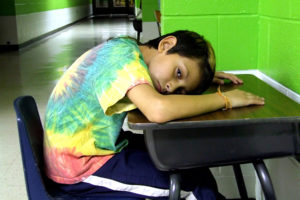Part one of a two-part series on the Nexus Global Studies program


When people think of destinations for student travel, most envision the usual European settings: Spain, Italy, France. But most people are not Willy Fluharty. Fluharty pictures students staying with Bedouins in Morocco, learning about Hinduism in Nepal, or irrigating a school garden in Zimbabwe.
Fluharty is the Director of Nexus Global Studies at Cape Henry Collegiate School (CHC) in Virginia Beach, Virginia. CHC is a private school that currently serves 950 children in grades pre-K through 12. It is long-established and well regarded, but many parents choose it because of its global focus and the opportunities it provides, starting in fourth grade, to travel with Nexus. Fluharty is happy to admit that the goals for the unconventional trips he has been organizing since 2003 have more to do with forming character than anything else.
“All travel is good, but it’s not all the same,” Fluharty says. “In Europe, the food is familiar, and the people look like them. But I want to take them out of their comfort zone and put them in a growth zone, where they are forced to adapt, to get comfortable with the risk of the unknown. I seek out adventures where there is very little western influence, where they are so far away from what they are familiar with that everything is new—new sights, smells, and people. They come back different.”
The Nexus Global Studies program has sent students to over 50 countries and to every continent but Antarctica. Some trips focus on service, such as hurricane cleanup, building schools, or helping at orphanages. Others center on science or language immersion. Fluharty has taken students to stay with the Kutump tribe in Papua New Guinea, where they participated in a bride price ceremony and a “sing-sing”—a traditional festival of singing and dancing. He also led a trip to India, where, after spending three days learning about Buddhism, students visited the Dalai Lama at his home. In 2006, CHC was the first US school to be welcomed by the government of Bhutan in South Asia.
“Visiting Bhutan at that time was like going back in time,” Fluharty says. “It is incredible to take kids to see a place that very few people have seen. It’s a unique experience. It’s like plugging their soul into a socket—they are electrified with an energy they haven’t known before.”
It is this potential for personal change that has inspired the leadership of CHC to make trips like this part of their school DNA. Last year, over 500 CHC students traveled through Nexus, which operated more than 30 programs, both domestic and international.
The travel options begin in fourth grade and continue through senior year. Most take place over the summer, and each time, there are six to eight international options, which range from 14 to 19 days in length. Last year, according to Fluharty, 61 percent of the graduating class had participated in at least one of the international programs.
Fluharty finds that cross-cultural trips stretch students mentally, physically, and spiritually. Students often stay in huts or tents. The bathing facilities are basic, and the food may be very different from what they eat at home. The kids often end up wrestling with issues like, Why do they seem happier than we do? According to Fluharty, students “question their materialism and who they are as a person.”
Fluharty also sees the children grow in courage and flexibility. “Kids who travel have higher self-confidence on so many levels because they have learned to deal with fear,” Fluharty says. “When you’re traveling, it’s unpredictable. Sometimes a bus breaks down and kids ask, What will we do? Often there’s not a lot of structure. But the kid that can thrive in an unstructured environment is a kid that’s going to thrive in life.”
Fluharty, who has joined almost every senior trip since 2004 (and other trips as well), is convinced that global exposure has a significant effect on civic engagement at home.
“My goal is to create better American citizens,” Fluharty says. “Travel makes students question who they are and American society and culture in general. I want them to come back and have a better ability to make an educated decision when they go to vote for somebody. They have become more multicultural, sensitive, and understanding. And these are all important qualities for a better American citizen.”
The examination of personal values, the development of courage, and the deeper concern for the greater good that Fluharty sees emerging from the Nexus program coincide with what sociologist James Davison Hunter refers to as “moral education.” In The Tragedy of Moral Education in America, he writes:
The purpose of moral education is to change people for the better and, in so doing, to improve the quality of life in society, so that, individually and collectively, we can become better people than we might otherwise be.
This moral education can happen in the classroom, but in the Nexus program, Fluharty and CHC have found a way to ensure it extends outside the classroom as well—even in far-flung destinations on the other side of the globe.